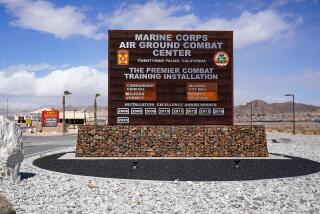Marine’s Death in Scandal Is Again Ruled a Suicide : Inquiry: Relatives of El Toro colonel retort that they were not interviewed and that the Corps is covering up. The victim was accused of personal use of planes.
- Share via
For the second time, the military has ruled that the shotgun blast that killed an El Toro Marine colonel last year in the midst of a scandal was self-inflicted, according to a report obtained Wednesday.
Two months ago, the family of the late Col. James E. Sabow persuaded the military to reopen its investigation into his death because of what survivors called new evidence suggesting that he may have been murdered.
But after an inquiry that officials said began in El Toro and was ultimately reviewed by the Navy secretary and the Marine Corps commandant, the military’s finding remained the same: Sabow, 51, killed himself.
“The evidence . . . supports, by any legal standard, a conclusion of suicide,” the report states. “There is absolutely no evidence of foul play.”
But Sabow’s relatives said that they were flabbergasted that the military could reach its finding without even interviewing them and that they are still not satisfied with the suicide finding.
“They never went through any of our allegations,” said Sally Sabow, the victim’s widow. “It’s just another cover-up, but I’m not surprised. It’s typical of the Marine Corps.”
The victim’s brother, John D. Sabow of South Dakota, said of the report: “It’s so full of lies that it’s overwhelming. . . . I can’t believe the biased, amateurish ways that they’ve twisted things.”
The new inquiry was apparently completed in December, but its findings were not given to members of the family until Wednesday and are not due to be released publicly until today.
Sabow’s body was found on his back-yard porch on the morning of Jan. 22, 1991, beside a toppled lawn chair and a 12-gauge, double-barreled shotgun.
Found by his wife when she returned from work, Sabow had been shot once in the head and was dead by the time paramedics arrived.
The new report traces in detail the hours before and after Sabow’s death and states that the colonel was acting nervous and “paranoid” on the morning of his death.
The paranoia, the report suggests, was caused by the threat of publicity over a scandal that had hit the El Toro Marine Corps Air Station over the use of base planes.
Five days before his death, Sabow had been suspended as the base’s assistant chief of staff, after allegations that he had flown planes to golfing jaunts, to ferry furniture to his son at college and to perform other personal trips.
The chief of staff at El Toro, Col. Joseph E. Underwood, also lost his job because of similar allegations and was forced into early retirement.
And months later, after Sabow’s death and details of the allegations against him were publicized, the scandal also enveloped the commanding general of the Marines’ western air bases. Brig. Gen. Wayne T. Adams--who had fired Underwood and Sabow--lost his command and was given a rare reprimand after it was found that he too had used a base plane improperly on at least one personal trip.
Sabow’s relatives continue to maintain that the colonel never violated military policy in flying base planes. They say many questions about his death remain unanswered.
Foremost is the disclosure that Sabow’s fingerprints were not found on the gun used in the shooting.
The report concludes that the colonel had recently showered, which would have reduced the oils on his hands, and that the heat from the muzzle blast “would have burned off any fingerprints left on the barrel.”
But the report acknowledges one mystery: Who called Sabow at 8:30 a.m.--just an hour before his body was discovered?
The report concludes that the call “may have had an effect on his mental state prior to the suicide.”
More to Read
Sign up for Essential California
The most important California stories and recommendations in your inbox every morning.
You may occasionally receive promotional content from the Los Angeles Times.













